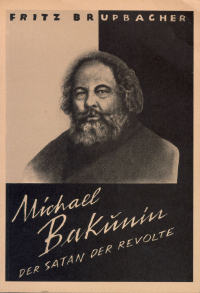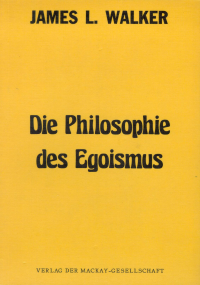Zur Aktualität der Philosophie Max Stirners
Seine Impulse für eine interdisziplinäre Diskussion der kritisch-krisischen Grundbefindlichkeit des Menschen
Herausgegeben von Bernd Kast und Geert-Lueke Lueken im Auftrag der Max Stirner Gesellschaft.
Leipzig: Verlag Max Stirner Archiv / edition unica, 2008 (= Der Einzige. Jahrbuch der Max Stirner-Gesellschaft, Band 1/2008). Broschur, 224 Seiten, ISBN 978-3933287816.
Beschreibung:
Das Jahrbuch „Der Einzige“ hat 2008 die gleichnamige zwischen 1998 und 2006 publizierte Vierteljahresschrift des Max Stirner-Archivs abgelöst. Es wird von Bernd Kast im Auftrag der 2002 gegründeten Max Stirner-Gesellschaft mit dem Ziel herausgegeben, Beiträge zu Leben, philosophischem Denken und zur Rezeption Max Stirners zu veröffentlichen und schwer zugängliche Quellen zu erschließen und diese einer interessierten Offentlichkeit zugänglich zu machen.
Die aktuelle Ausgabe enthält Beiträge von Bernd Kast, Geert-Lueke Lueken, Ferruccio Andolfi, Wolfgang Eßbach, Beate Kramer, Maurice Schuhmann und Ralf Lienard. Siehe auch die ausführlichen Abstracts (deutsch/englisch) in der Rubrik "... und mehr".
- Bernd Kast: Stirner und die kritisch-krisische Grundbefindlichkeit des Menschen
- Geert-Lueke Lueken: Die Verstellung des Herrn Schmidt
- Ferruccio Andolfi: Stirners Einfluss auf und Kritik an Ludwig Feuerbach
- Wolfgang Eßbach: Auf Nichts gestellt. Max Stirner und Helmuth Plessner
- Frank C. Hansel: Stirner – eine postmoderne Revision
- Geert-Lueke Lueken: Sprachkritik und Ironie. Verwandte Figuren bei Stirner und Rorty
- Beate Kramer: Kann ich wissen, ob das, was ich tun will, richtig ist? Stirner und de Sade zur Aporie vernünftigen Handelns und Denkens
- Maurice Schuhmann: Philosophische Provokateure: Marquis de Sade und Max Stirner
- Nikos Psarros: Die Leere der Gesellschaft bei Franz Kafka und Max Stirner
- Ralf Lienhard: Stirners Freiheitsphilosophie als pädagogisches Konzept
Deutsche Abstracts
Stirner und die kritisch-krisische Grundbefindlichkeit des Menschen (Bernd Kast):
Ausgehend von Überlegungen zu einer kritisch-krisischen Anthropologie des Mainzer Philosophen Richard Wisser geht der Beitrag philosophiegeschichtlichen Wurzeln von Kritik und Krise von Kant bis Habermas nach, um die profilierte Bedeutung des Themas bei den Junghegelianern und Max Stirner aufzuzeigen. Stirner radikalisiert die anthropologische Fragestellung und gibt dadurch für Philosophie, Soziologie, Kunst, Literatur und andere Bereiche provozierende und bis heute virulente Impulse.
English Abstracts:
Stirner und die kritisch-krisische Grundbefindlichkeit des Menschen (Bernd Kast):
By connecting the concepts of critique and crisis, the German philosopher Richard Wisser has coined the idea of a “kritisch-krisische Anthropologie”. Taking this idea as a starting point, the contribution reconstructs the historical roots and developments of the concepts “critique” and “crisis” from Kant to Habermas and shows the eminent role these concepts play in the philosophies of the “Junghegelianer” and, in particular, of Max Stirner. Stirner approached the anthropological question in the most radical way and gives provoking and still relevant impulses for discussion in philosophy, social sciences, arts and other fields.
Die Verstellung des Herrn Schmidt (Geert-Lueke Lueken):
Whereas Max Stirner’s “The Ego and its Own” still is a kind of philosophical bestseller, academic philosophers seem to regard this book as a piece of rather weak philosophy or political theory. Those readers, who do not simply put it aside, often try to classify it politically: Some see Stirner as a protofashist, for others he is a hero of individualistic anarchism. – Trying to escape these ideological debates and classifications, this paper offers a fresh reading of Stirner’s work. It proposes to take Stirner as an ironic philosopher who is not to be read literally. Instead, his writings could be read ironically as a performance of roles and thought experiments showing the absurdity and nonsense of the figures and -isms on stage. Stirner does not seriously proclaim Egoism, he rather is trying to make non-sense of all kinds of -isms in philosophy and politics.
In 1845, Stirner and Feuerbach had an interesting argument. There is no need to take sides in this controversy, in order to see how we may intellectually profit from it: While Feuerbach does not sufficiently emphasize the coherence of the self, Stirner reflects the reference of the ego to itself in such a radical way that the social dimension of the self is almost ignored. However, the common humanity is a property inherent in every human individual. Seeing this potential as always already actualised, Stirner blocks possible self-realisations of the individual, while, on the other hand, he prevents us from a too naïve talk of the “essential” human condition.
The question, asked in this paper, is whether there are aspects of Max Stirner’s thought appearing in the work of Helmuth Plessner. This question, firstly, leads to the context of the Stirner-reception between the world wars. Secondly, the contribution shows more systematic resemblances of Stirner’s figure “Der Einzige” and Plessner’s concept of the human “exzentrische Positionalität”. Both figures of thought lead into the open domain of a critical, subversive, and fallible anthropology.
Stirner – eine postmoderne Revision (Frank C. Hansel):
After Hegel, we see his optimistic idea of a synthesis of the different as no more justifiable. Marx and Engels criticised capitalism in a teleological perspective. Today, however, the focus is more on the postmodern revision, initiated by Max Stirner. He destroyed the domaining idea of normativity by rejecting all universal, general, or conceptual claims. Anticipating postmodern tendencies, Stirner founded the apology of contingency.
The background of Stirner’s ironic way of philosophising is his nominalistic critique of language (“Sprachkritik”). If this claim is right, Stirner anticipated an intellectual move that has been repeated in the context of Analytic Philosophy in the 20th Century by Richard Rorty. Looking at Rorty, we see, again, why and how a nominalistic critique of language leads to a way of doing philosophy in the mode of metaphor and irony. This paper shows some resembling figures in Stirner’s and Rorty’s thinking: Both reject the notion of a correspondence of predicates to something “real”, both reveal the confusion of predicates and names as a source of metaphysical reifications, they share some insights in the peculiar use of “I”, “Me” and “Myself” and justify metaphoric and ironic speech as a way of individually (re)creating oneself.
Kann ich wissen, ob das, was ich tun will, richtig ist? Stirner und de Sade zur Aporie vernünftigen Handelns und Denkens (Beate Kramer):
The concepts of reason in the thinking of de Sade (reason as part of nature) and Stirner (reason as something that cannot be deduced from nature) are reconstructed on the background of Kant’s and Hegel’s aporetical and metaphysical construals of human rationality. Stirner sees reason as being produced by a permanent autopoiesis, while de Sade regards it as being constituted by the revolutionary sovereignty of the Libertin. Despite of these differences both agree in their renunciation from the optimism of Enlightenment.
The article examines the historical and conceptual relationship between Max Stirner and Marquis de Sade on the basis of the analysis and the comparison of three pivotal aspects of their Philosophies of Freedom.
The article aims at showing that Stirner’s critical reconstruction of the concept society as an external principle of organisation of human life, which is experienced necessarily by the individuals as a form of coercion, has a counterpart in Franz Kafka’s short story Community (Gemeinschaft). However, in contrast to Stirner who thinks that this external coercive principle cannot be reconciled with the intentions of the individual, Kafka shows in the short story Building the Chinese Wall (Beim Bau der Chinesischen Mauer) that the principle of society provides the condition for the realisation of a personal human life.
Stirners Freiheitsphilosophie als pädagogisches Konzept (Ralf Lienhard):
Stirner’s essay The Irreal Principle of Our Education, published 1842, demanded revolutionary changes in the pedagogics of its time, which remain still relevant. Stirner rejects a formal notion of knowledge in favour of the promotion of a creative will that aims at forming a free, self-confident personality. Stirner’s ideas influenced also the founder of the Waldorf school movement, Rudolf Steiner.
Diesen Artikel haben wir am 16.10.2011 in unseren Katalog aufgenommen.



